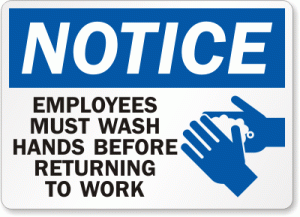“…(the State of Oregon) decided to remove the bare-hand contact prohibition from the proposed rules because this issue needs further discussion…the group will convene multiple times over the next few months. The state  will continue to enforce its double hand-washing rule for food servers until any changes are announced…”
will continue to enforce its double hand-washing rule for food servers until any changes are announced…”
The Oregon Health Authority is shelving its proposed rule mandating that restaurant workers not prepare food with their bare hands. State health officials have decided to convene a work-group on standards to prevent food-borne illness. The group will work toward a substitute to the so-called “no bare hand contact” rule originally proposed by the Health Authority.
That provision was to take effect on July 1, but was delayed after protests from the food service industry. The work group will include restaurateurs, legislators, medical professionals and others.
Gail Shibley, the administrator of the OHA’s Public Health Division, said her agency is looking for diverse opinions. “We think we can get the wisdom from restaurateurs as well as a variety of other folks to really dig into the details of this specific provision, and move forward at a later date,” she said.
For more: Â http://www.mailtribune.com/apps/pbcs.dll/article?AID=/20120713/NEWS07/120719990/-1/NEWSMAP
Image provided by MyDoorSign.com








